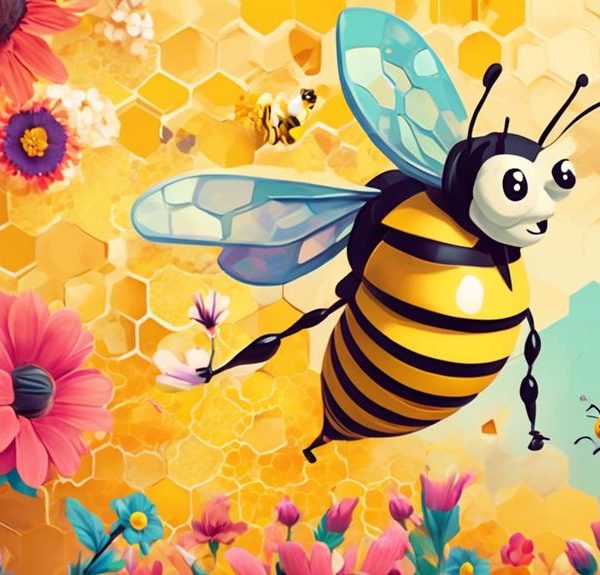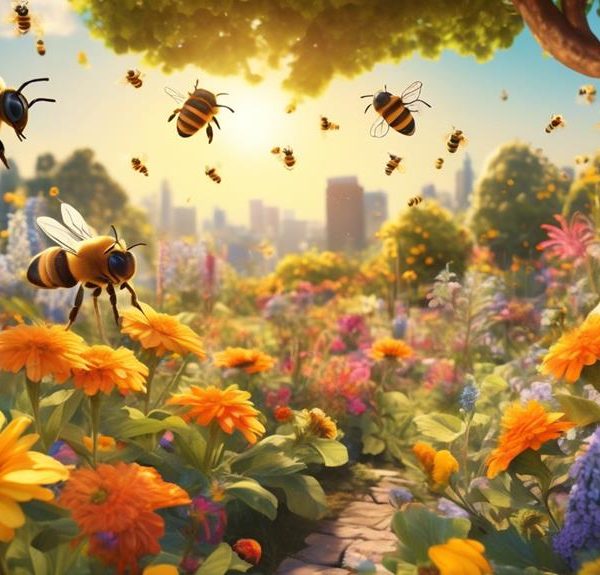Step into the fascinating world of bees and discover why they tirelessly produce honey, a crucial element of their survival and our ecosystem.
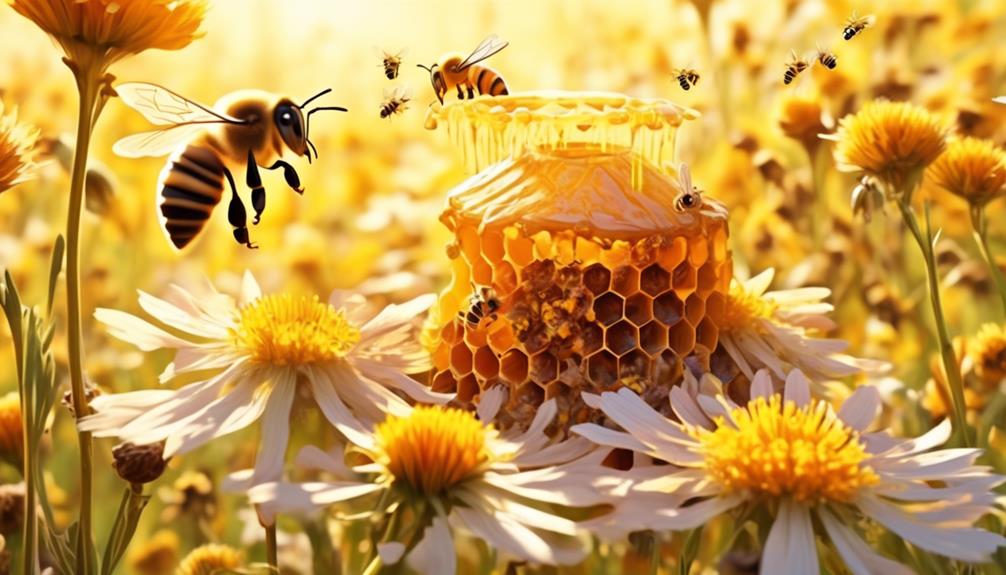
Why Do Bees Make Honey?
Have you ever wondered why bees go through all the trouble to produce honey? You're not alone.
In the fascinating world of these buzzing creatures, honey production is not just a random event, but a critical part of their survival and overall function within our ecosystem. It's a complex process involving nectar collection, regurgitation, and evaporation.
However, the story doesn't end with the sweet substance we humans enjoy. Stick around, as there's so much more to uncover about these industrious insects and their golden gift to the world.
Key Takeaways
- Bees collect nectar from flowers using their long tongues and store it in their honey stomach.
- Nectar is broken down by enzymes in the honey stomach and regurgitated for other bees to further process.
- Processed nectar is deposited into honeycomb cells and fanned to evaporate excess water, resulting in honey production.
- Honey serves as the primary energy source for bees, especially during colder months, and contains essential nutrients for their health.
The Biology of Bees
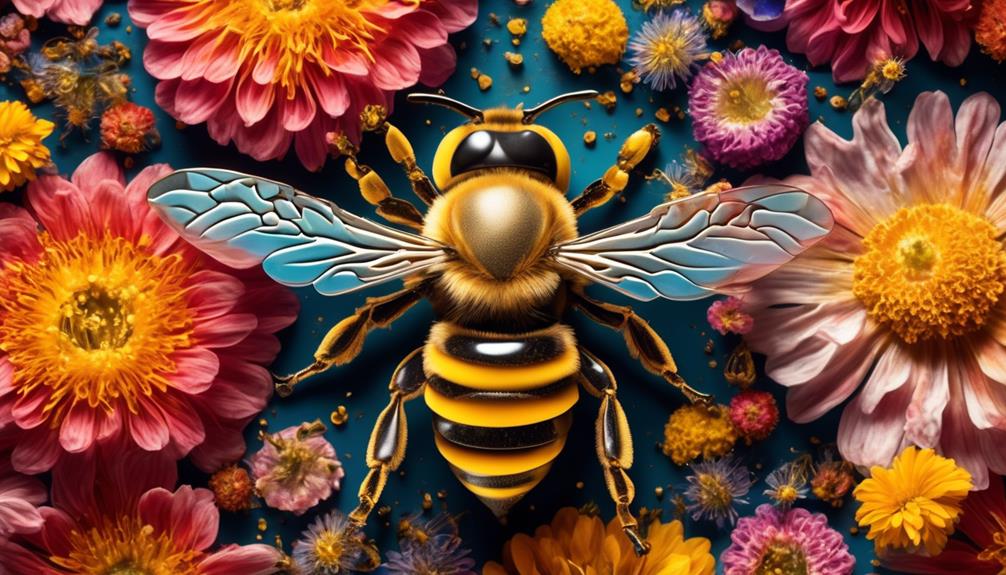
Diving into the biology of bees, you'd discover a complex and fascinating organism, perfectly designed for its role in nature. Bees are members of the Apidae family, comprising over 20,000 species. They're renowned for their role in pollination, a crucial process in the survival of our ecosystem.
You'd notice that a bee's body is divided into three segments: the head, thorax, and abdomen. The head houses their compound eyes, antennae, and mouthparts. The thorax, attached to the head, is where you'd find the wings and legs. The abdomen contains the stinger, a defensive mechanism used primarily by worker bees.
Bees possess a unique form of communication known as the 'waggle dance.' Through this dance, bees can convey the location of food sources to their hive mates. This intricate communication is a testament to their high level of social organization.
Furthermore, bees have an efficient digestive system designed for their diet of nectar and pollen. They also have specialized glands that produce beeswax and royal jelly, substances vital for hive construction and feeding larvae respectively.
Understanding the biology of bees isn't just fascinating; it underscores their crucial role in our ecosystem.
Understanding Honey-Making Process
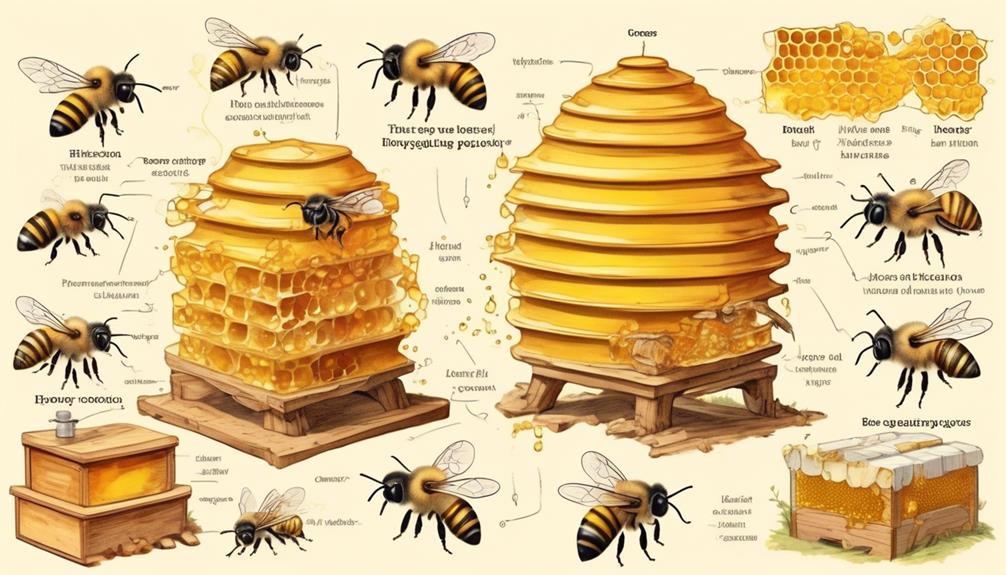
Building on the intricate biology of bees, let's now unravel the fascinating process through which these industrious creatures transform nectar into honey. It all starts when a bee collects nectar from a flower. The bee uses its long, tube-shaped tongue to extract the sweet liquid, which is then stored in its honey stomach.
This isn't your typical stomach; it's a specialized organ where enzymes begin breaking down the complex sugars of the nectar into simpler ones. Once back at the hive, the bee regurgitates the processed nectar and passes it on to a hive bee. The hive bee continues the breakdown, further converting the sugars and reducing the water content.
Now comes the final phase. The processed nectar is deposited into a honeycomb cell, where bees fan it with their wings to accelerate evaporation. As the water content reduces, the nectar becomes thicker, turning into the viscous golden substance we know as honey. Finally, bees seal the cell with a wax cap, preserving the honey for future consumption.
This tireless labor isn't just for their sustenance. Bees' honey-making also plays a critical role in human lives, offering us a natural sweetener packed with health benefits.
The Role of Nectar in Honey Production
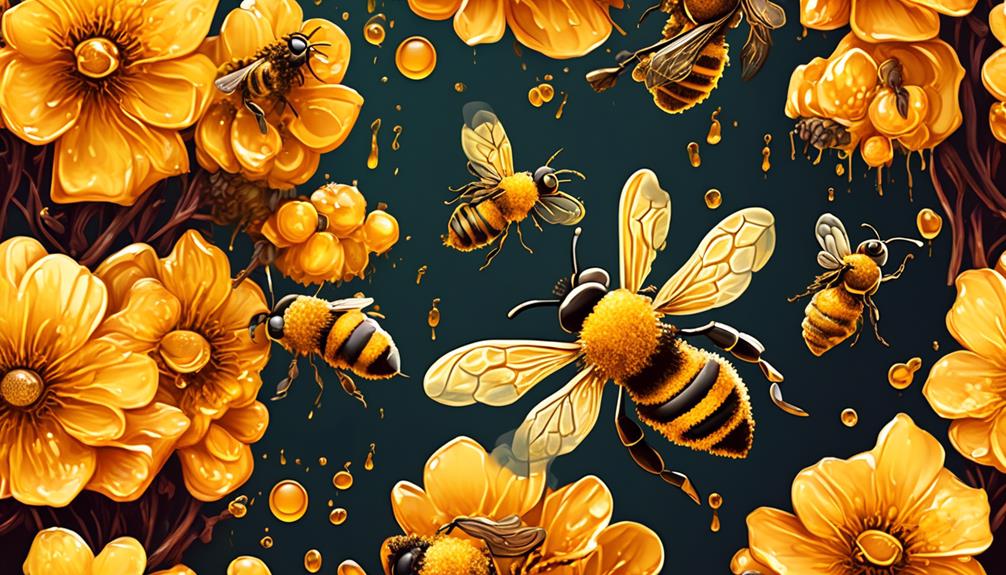
To fully appreciate the honey-making marvel, you must understand the fundamental role nectar plays in this intricate process. Nectar is a sweet, sticky liquid produced by flowers to attract pollinators like bees. It's primarily composed of water and sugars, such as fructose and glucose.
As a bee forages, it collects nectar using its long, tube-shaped tongue and stores it in a special stomach, called the honey stomach. This isn't where digestion occurs, but rather, it's a vessel for transportation. Here's where the magical transformation begins. The bee introduces enzymes into the nectar, which start to break down the complex sugars into simpler ones – a process known as inversion.
Once back at the hive, the bee regurgitates the nectar for other 'house' bees to further process with their own enzymes. The bees then deposit the nectar into the honeycomb cells, where it still holds too much water to be considered honey. They fan their wings to evaporate this excess water, concentrating the nectar into thick, sweet honey.
You see, without nectar, there'd be no honey. It's the crucial first ingredient in an extraordinary process.
The Importance of Honey for Bees
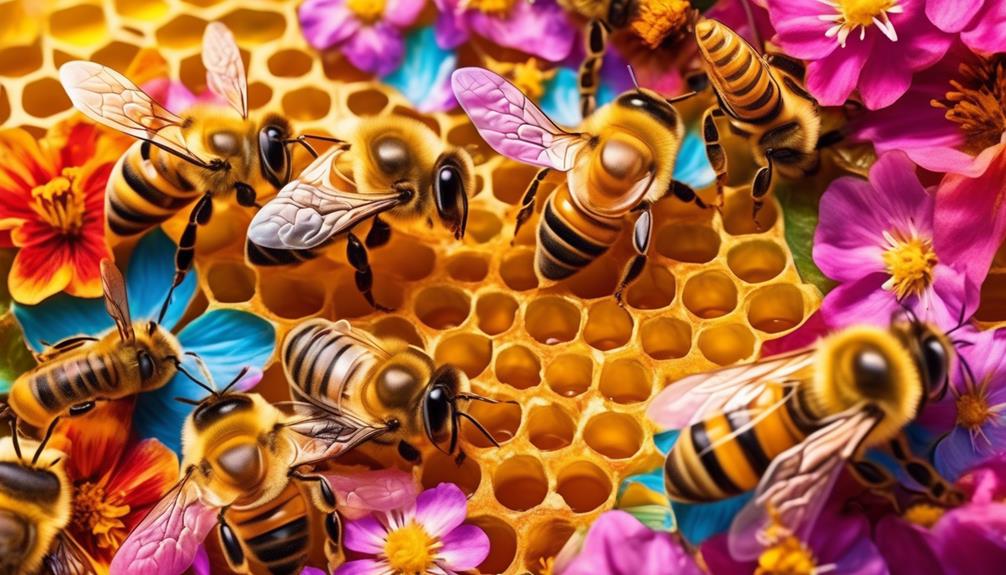
Having understood the intricate process of honey production, let's now consider why this sweet substance is so vital for the bees themselves.
Honey serves as the main energy source for bees, particularly during the colder months when flowers aren't in bloom and nectar, their primary food source, is scarce. You see, honey is a calorically dense food, packed with sugars that bees can easily convert into energy. In fact, a single gram of honey provides bees with about 4 kilocalories of energy, enough to fuel hundreds of wing beats. It's the perfect high-energy food for their high-energy lives.
But it's not just about energy. Honey also contains small amounts of proteins, enzymes, amino acids, minerals, and vitamins, all necessary for bees' health. They need these micronutrients for their growth, immunity, and reproduction.
Moreover, honey's long shelf life allows bees to store it for extended periods. Bees create a surplus of honey during the warm months to ensure their survival through the winter. It's their version of a pantry, stocked with preserved food ready for consumption when fresh food isn't available.
In essence, honey isn't just a product of bees' labor; it's their lifeline, their survival strategy, and their sustenance. That's why honey is so important for bees.
Honey's Impact on Ecosystems
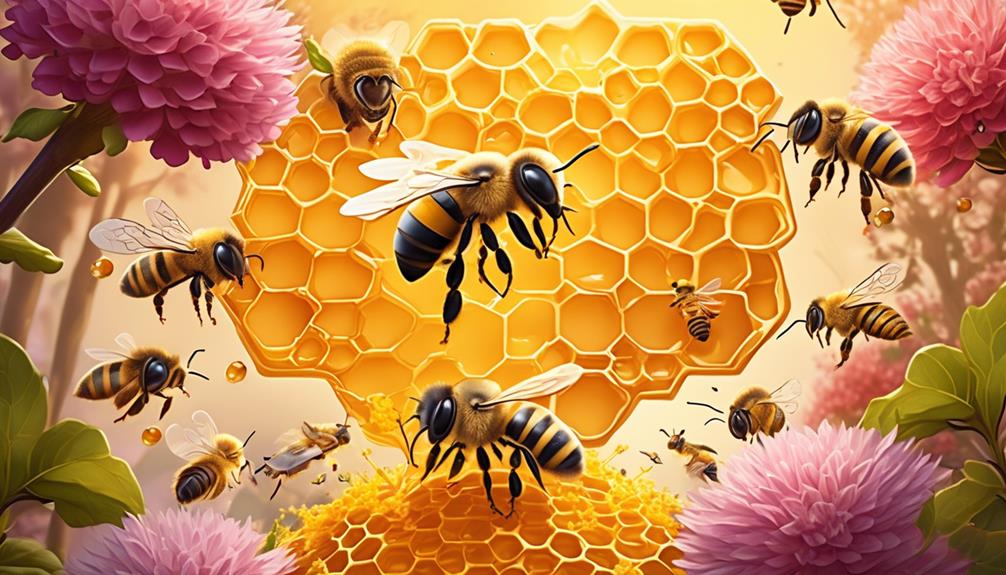
Often overlooked, the influence of honey extends beyond the hive, playing a significant role in ecosystems around the world. You mightn't realize it, but the honey production process is integral to the survival of countless species – it's a key food resource not just for bees, but for other insects, birds, and mammals.
Honey's high sugar content provides a potent energy source for many creatures. Its production also promotes plant biodiversity. When bees collect nectar for honey, they're also pollinating flowers, aiding in plant reproduction. This creates ripple effects throughout the food chain, supporting herbivores and, in turn, their predators.
Moreover, honeydew honey, made from the sugary secretions of insects rather than floral nectar, contributes to nutrient cycling. It's a vital part of many ecosystems, particularly in areas with few flowering plants.
Yet, it's not all sweet. Overharvesting of honey can disrupt this balance, leaving less for other creatures and potentially impairing pollination. So, next time you enjoy that honey-sweetened cup of tea, remember you're part of a complex, global ecosystem, where even the sweetest of substances plays a vital role.
Frequently Asked Questions
How Long Does It Take for Bees to Produce Honey?
You're curious about how long it takes for bees to produce honey. Well, it's a bit complex.
Bees gather nectar from flowering plants, which they then convert into honey within the hive. This process takes a few days.
However, considering the time bees need to mature and start foraging, plus the time needed for colony build-up, you're looking at a few months for a colony to start producing significant amounts of honey.
What Is the Lifespan of a Honey Bee?
You're curious about the lifespan of a honey bee, aren't you? Well, it varies among the types.
Worker bees typically live for 5-6 weeks during the summer, while drones live around 8 weeks. Queen bees, however, have a much longer lifespan, often living up to 5 years!
It's a fascinating hierarchy where each bee's lifespan is determined by their role within the colony.
Isn't nature's design amazing?
Are There Any Health Benefits to Consuming Honey for Humans?
Yes, there are several health benefits to consuming honey.
It's packed with antioxidants which can help protect your body from cell damage due to free radicals.
Honey also has antibacterial and anti-fungal properties, and can soothe a sore throat.
It's a healthier alternative to refined sugar as well.
However, remember to consume it in moderation, as it's still high in calories and sugar.
How Does Climate Change Affect Honey Production?
Climate change affects honey production significantly. As temperatures rise, plant blooming patterns shift, throwing off bees' foraging schedules. Some plants may not survive the heat, reducing the bees' food sources. Uneven rainfall patterns can also disrupt plant growth.
You'll see less honey when bees can't gather enough nectar. So, you're not just losing honey, but also witnessing an ecological imbalance that can have far-reaching consequences.
Are There Different Types of Honey for Different Types of Bees?
Yes, there're different types of honey, but not because of different types of bees. Rather, honey's flavor, color, and texture vary based on the nectar source visited by the bees.
For instance, clover honey is light and mildly sweet, while buckwheat honey is dark and strong. It's fascinating to consider the wide variety of honey types, all thanks to the diverse range of flowers and plants the bees visit.
Conclusion
So, now you've got the buzz on why bees make honey. It's not just a sweet treat for us humans, but a vital energy source for them. From gathering nectar to producing honey, every step is essential for their survival.
Beyond that, honey production plays a significant role in maintaining our ecosystems.
Next time you drizzle honey onto your toast, remember the industrious little bees and their important contribution to our world.

